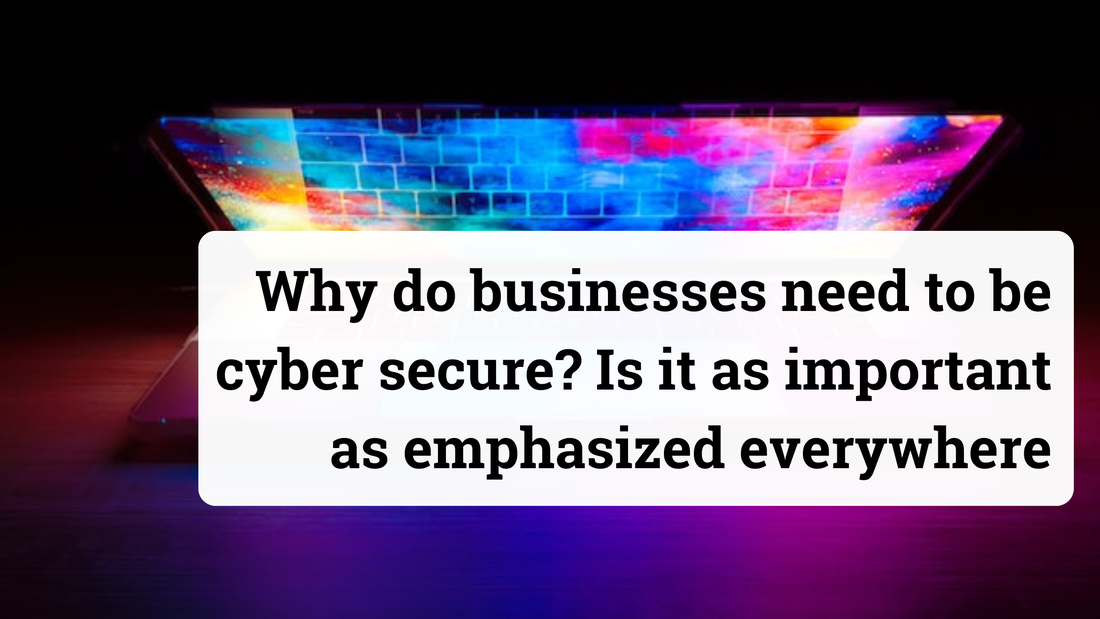|
In today's digital age, businesses are becoming increasingly dependent on technology to conduct their operations. From managing customer information to financial transactions, businesses rely heavily on computer systems and networks to run their day-to-day operations. However, with this reliance on technology, comes the risk of cyber threats that can compromise the sensitive information stored on these systems. As hackers are constantly looking for vulnerabilities in systems to exploit for their gain, businesses are a prime target. This is where cyber security comes in. Cybersecurity refers to the measures taken to protect computer systems and networks from unauthorized access, theft, damage or disruption. With the rise of cyber attacks and data breaches, it is imperative for businesses to take cyber security seriously. So we will be diving into why your business needs to be cyber secure, and the best practices for cybersecurity. Reasons Why Businesses Needs To Be Cyber Secure 1.Protect Sensitive Information: One of the most significant reasons businesses need to be cyber secure is to protect their sensitive information. Businesses collect and store a vast amount of sensitive information, such as customer data, financial information, and trade secrets. A cyber attack can result in the loss of this information, which can cause significant damage to a business's reputation and finances. 2.Legal and Regulatory Compliance Many businesses are required to comply with various laws and regulations related to data protection to operate legally. For example, the Payment Card Industry Data Security Standard (PCI-DSS) for businesses that handle credit card information , and the Personal Data Protection Act (PDPA) in Singapore. Failure to comply with these regulations can result in hefty fines and legal penalties. By implementing cyber security measures, businesses can ensure that they comply with these regulations and avoid legal troubles. 3.Business Continuity A cyber attack can disrupt business operations, resulting in lost revenue and decreased productivity. In some cases, businesses may even have to shut down completely. By implementing cyber security measures, businesses can ensure that their systems are protected and can continue to operate even in the event of a cyber attack. 4.Customer Trust Cyber security is becoming an increasingly important factor in building and maintaining customer trust. Customers want to know that their personal and financial information is safe when doing business with a company. By demonstrating a commitment to cyber security, businesses can build trust and loyalty with their customers. 5. Safeguard Reputation A cyber attack can significantly damage a business's reputation. A data breach can lead to the exposure of sensitive information, which can result in a loss of credibility. By implementing cyber security measures, businesses can safeguard their reputation. Best Practices for Cybersecurity
Takeaway In short, businesses need to be cyber secure to protect their sensitive information, comply with legal and regulatory requirements, ensure business continuity, and build customer trust. By implementing best practices for cyber security, businesses can mitigate the risk of cyber attacks and protect themselves and their customers. Related Topics 7 Types of Cybersecurity Measures SMEs Need to Protect Their Business Ransomware - A Growing Problem & Best Practices For You And Your Company Comments are closed.
|
Archives
June 2024
Categories
All
|
|
© 2021, TAFA HOLDINGS (S) PTE LTD. ALL RIGHTS RESERVED
|


 RSS Feed
RSS Feed